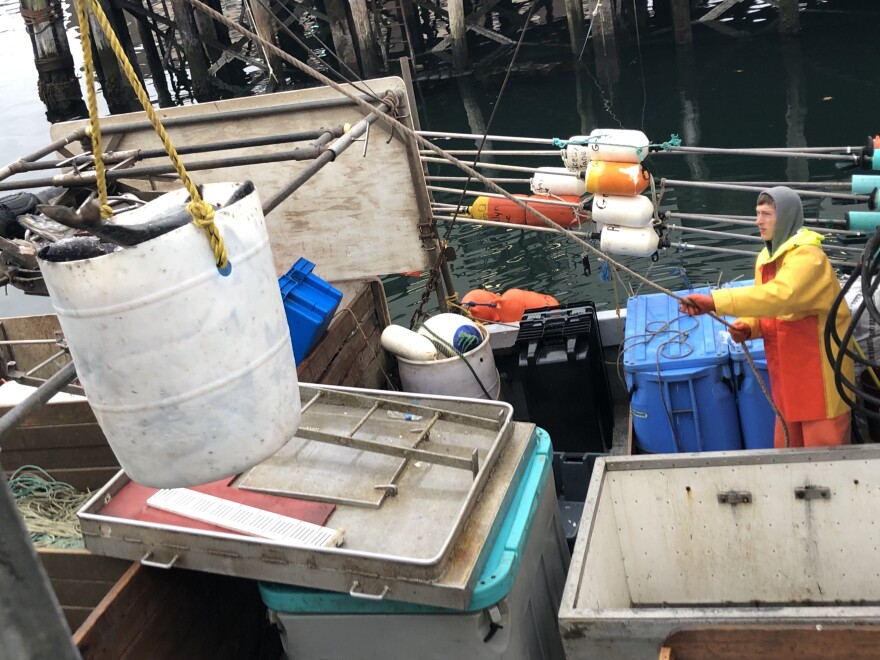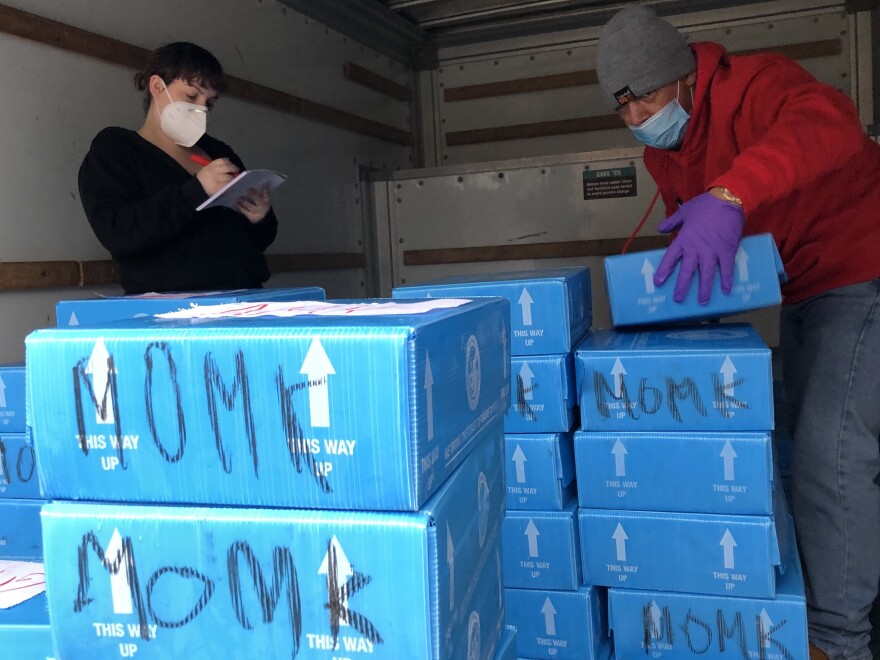The COVID-19 pandemic is contributing to rising hunger in Maine, and at the same time much of the state’s seafood harvest is struggling to find a market. Now a new program is addressing both challenges at once.
On a recent morning Bryan Pearce and his two-man crew motored his 45-foot gill-net trawler, the Gracelyn Jane, back to a Portland pier after two days at sea.
“We got 4,000 or 5,000 pounds total. Pollock, about 20 miles out,” Pearce says.
Baskets full of fish are winched into the sky, gleaming like silver ingots, and dumped into a chute. Thanks to a new program, “Fishermen Feeding Mainers,” many will be bought at a guaranteed floor price of $2 a pound, then shipped to food banks and schools around the state.
It’s a lifeline for Pearce in this year of COVID. Starting last spring, demand for most fish dropped precipitously as restaurants closed and access to foreign markets was shut off.
“I didn’t fish all summer. I didn’t start fishing until the project came about. So once that happened I started going full time. I had a guaranteed price, I knew what I could make. I said, ‘Well, that takes all the guesswork out of it, I’ll go. I’ll do it,’” he says.
Mary Hudson of the Maine Coast Fishermen’s Association, which spearheaded the program, says the value of the state’s groundfish harvest dropped by almost 75% this year. And even at pennies per pound, some of it went unsold.
“So we were trying to figure out a way to help them out throughout this, and at the same time reading about food insecurity in Maine and people really struggling during the pandemic. And it just seemed like the perfect marriage of two causes,” she says.
The program was launched with an anonymous donation of $160,000, another $200,000 in pandemic relief funds and individual donations. And people are lining up for it.
“This is about 1,700 pounds of fish, approximately, and this is the most we’ve done so far, so it keeps growing,” says Nori Hilton who, with Sebastian Limones, was stacking boxes of monkfish on a recent Saturday that were caught by the Gracelyn Jane.

Since spring, every Saturday has seen dozens of “Food Brigade” volunteers like them meet here to pack up boxes and bags full of fresh produce — and now high-quality, high-protein fish, to be delivered around the city.
Much of it is destined for Latino, Asian and African immigrants who work in Maine’s big meat and seafood processing plants.
Sebastian Limones is an immigrant from El Salvador who picks lobster and packs fish for local companies. The seafood industry’s pandemic-driven dislocations have cost him work. So in in addition to volunteering with the food brigade he is, for now, a client.
Limones says he’s having a tough time getting into the holiday spirit. He says his boss tells him there won’t be any work for at least the first two months of the new year. He’s one of 2,000 people the Food Brigade is serving, and there is a growing waitlist — as is the case at food banks around the state.
Experts estimate that need has risen more than 20 percent due to the pandemic — roughly 7 million meals worth.
The Fishermen Feeding Mainers program is a new tool in the statewide effort to knock those numbers down. And its beneficiaries aren’t just fishermen and the hungry.
“If it weren’t for that program we would be seeing next to nothing,” says Nick Pappas, general manager at the Portland Fish Exchange, which operates the auctions that are held when hauls come in — but which loses revenues when prices fall so low that the fishermen just keep their boats tied to the dock. “When their boats do well, we do well. By the fixed fee that’s already set aside for these fish, we get to keep an OK amount, which has helped us keep the lights on.”
Some commercial fish buyers were at first wary about competition, and Hudson with the Maine Coast Fishermen’s Association says it takes some care to ensure the charitable purchases don’t distort wholesale prices.
But she notes that the program is able to throw processing work to local buyers who’ve also suffered from the pandemic.
“So being able to get some more work on the books and process this fish and not have to find a home for it has been really helpful for them,” Hudson says.
Back at the Portland pier, fisherman Rob Odlin says by strengthening links throughout the seafood supply-chain, the program is benefiting even those, like him, who aren’t direct participants.
“Everybody wins. The boats, the dock workers, the harbor, the cutters, the lobstermen get the reduced price for bait because it’s here, instead of having to travel. It’s the name of the game. Thirty, 40 miles away you’ve got an almost unlimited supply of dinners for people,” he says.
By last week, Fishermen Feeding Mainers had bought and donated 150,000 meals worth of fresh protein from the Gulf of Maine, outpacing early goals. Program officials say requests from community partners are rising with the latest coronavirus surge, and are planning a new round of fundraising for 2021.


